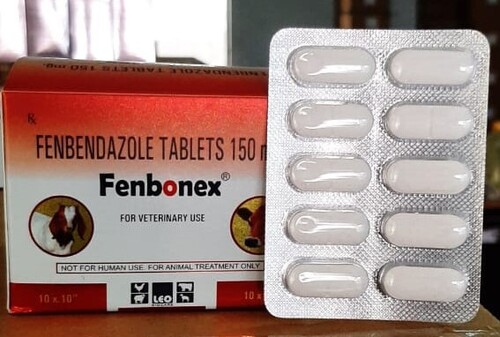fenbendazole: Its Role in Pet Health Today
Wiki Article
Recognizing the Advantages and Uses of Fenbendazole in Vet Medication
Fenbendazole has developed itself as an essential anthelmintic in veterinary medication. Its capability to target various parasitical infections makes it a beneficial device for vets. The drug's mechanism disrupts essential cellular processes in parasites, resulting in reliable treatment results. Its safety and security profile differs between varieties, necessitating cautious consideration in its use (fenbendazole 444). Recognizing these dynamics can clarify fenbendazole's more comprehensive ramifications in veterinary care and recurring research into its prospective past traditional applicationsMechanism of Action of Fenbendazole

Common Parasitical Infections Dealt With With Fenbendazole
A range of parasitic infections are efficiently treated with fenbendazole, making it a functional alternative in veterinary medicine. This anthelmintic agent is specifically efficient versus nematodes, including roundworms and hookworms, which generally impact dogs and pet cats. It is also used for the therapy of cestodes, such as tapeworms, offering a wide spectrum of activity against both sorts of digestive parasites. Furthermore, fenbendazole is valuable in managing infections triggered by protozoa, specifically Giardia, which can result in stomach distress in animals. Its efficiency encompasses treating certain lungworms in canines and felines, resolving respiratory health and wellness problems connected to these parasites. Generally, fenbendazole's capacity to target numerous parasitical species makes it a valuable tool in veterinary method, guaranteeing the health and wellness and well-being of family pets affected by these typical infections.Security and Efficacy in Different Animal Variety
The safety and security and efficacy of fenbendazole vary among different pet varieties, emphasizing the importance of species-specific factors to consider in veterinary medication. In dogs, fenbendazole is usually well-tolerated and reliable versus a variety of stomach parasites, including roundworms and hookworms. For felines, however, its usage is less typical and might need careful application as a result of possible adverse responses.In animals, such as livestock and lamb, fenbendazole demonstrates efficiency versus numerous endoparasites, adding to enhanced health and wellness and efficiency. The pharmacokinetics and possible side impacts can vary significantly between species, necessitating mindful evaluation by veterinarians.
Horses additionally respond favorably to fenbendazole, specifically for treating strongyles and ascarids, though dose and management courses need to be tailored to their distinct physiology. Understanding these differences is vital for enhancing therapy end results and making certain animal well-being throughout varied types.
Management and Dosage Guidelines
Correct management and dosage standards are crucial for maximizing the restorative effects of fenbendazole while minimizing prospective negative effects. The dosage commonly imp source differs depending on the varieties being treated, the certain problem, and the formula of fenbendazole used. fenbendazole 444. For canines and pet cats, a common dose is 50 mg/kg body weight, provided as soon as daily for three successive days, however veterinarians might adjust this based on specific health assessmentsIt is vital to carry out fenbendazole with food to improve absorption and minimize intestinal trouble. The drug is readily available in numerous kinds, consisting of granules and paste, enabling flexible administration options. Keeping track of the pet's reaction throughout and after treatment is advisable to validate efficacy and security. Furthermore, veterinary support is vital to determine the appropriate duration of treatment based on the kind of parasitic infection being attended to, assuring optimal outcomes for the pet's health.
Future Perspectives and Study on Fenbendazole
Research study on fenbendazole remains to develop, concentrating on its possible applications past conventional antiparasitic uses. Recent research studies have discovered its effectiveness in treating numerous types of cancer cells, especially Continue in veterinary oncology. Initial data recommend that fenbendazole may inhibit the growth of lump cells and improve the impacts of various other chemotherapeutic agents.Scientists are investigating its role in handling intestinal conditions in animals, highlighting its anti-inflammatory homes. The flexibility of fenbendazole for various types questions about its security accounts and suitable dosing regimens in diverse populations.
As rate of interest expands, there is a need for complete clinical tests to develop evidence-based standards for these novel applications. Future research study may also check out the devices behind fenbendazole's effects, possibly paving the means Find Out More for cutting-edge restorative strategies in vet medicine. The ongoing expedition of fenbendazole could substantially enhance therapy options for numerous veterinary conditions.

Frequently Asked Questions
Is Fenbendazole Safe for Pregnant Animals?
The security of fenbendazole for expecting animals continues to be unclear. While some studies suggest very little risk, vets typically recommend care and typically recommend versus its use throughout maternity unless the benefits plainly surpass potential risks.Can Fenbendazole Be Used in Livestock?
Fenbendazole is generally used in livestock to deal with numerous parasitical infections. fenbendazole capsules. Its efficiency against intestinal worms makes it an important anthelmintic, contributing to improved health and productivity in animals elevated for food and fiberWhat Are the Adverse Effects of Fenbendazole?

The side impacts of fenbendazole might consist of intestinal disruptions, sleepiness, and allergies. In rare cases, extra extreme reactions could happen, necessitating careful tracking and consultation with a veterinarian throughout therapy.
How Does Fenbendazole Compare to Other Dewormers?
Fenbendazole supplies broad-spectrum efficiency versus different bloodsuckers, typically comparing favorably to various other dewormers. Its distinct device targets various life phases, making it reliable, while usually offering a favorable safety profile contrasted to options available on the marketplace.Can Fenbendazole Be Utilized for Treating Cancer Cells in Animals?
The potential of fenbendazole in treating cancer in family pets has gathered passion. Initial research studies suggest it may prevent cancer cell development, however further study is essential to verify its efficiency and safety in veterinary oncology.Report this wiki page